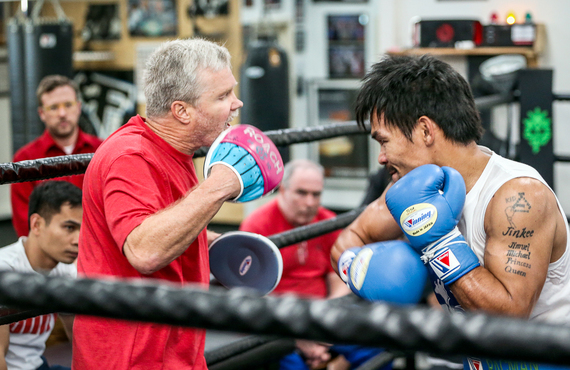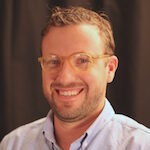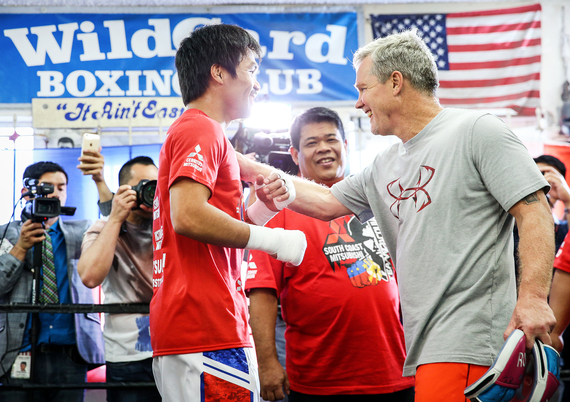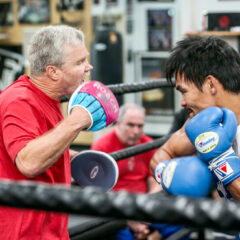This post originally appeared on Huffington Post.
Freddie Roach is the best known and one of the most beloved trainers in the history of boxing. He has posed for more selfies than President Obama, and A-list celebrities step out of their limousines in front of the Wild Card gym just to say hello to the 56 year-old from Dedham, Mass.
I left a message with Robert Duvall—the actor, fight fan and friend of Roach—to get a quote. Since I was asking about Freddie, Duvall called me right back.
“He is a true character and an expert at what he does,” Duvall said. “We are always attracted those people, legitimate and interesting characters, especially in my business.”
Duvall is a fan of Manny Pacquiao—Freddie’s most famous fighter—and has spent time at the Wild Card watching Freddie Roach practice his craft. “Freddie is approachable, and you can talk with him,” Duvall said. “But there is still an edge there,” he added. “And that’s okay—I have an edge too.”
When I stopped by the Wild Card last week, I spoke to Roach about Pacquiao and the upcoming fight against Timothy Bradley in Las Vegas. But mostly we talked about two conversions: Pacquiao’s born-again experience three years ago and a dramatic change in Freddie’s own life that involved no religion at all.
At his gym in Hollywood, Roach told me how a recent trip back to Dedham brought him face to face with the person he was in his teens and 20s. Roach met a friend who had known him during his years as a hardscrabble school boy, and the friend asked him, “Freddie, what happened to you?” Puzzled, Roach responded, “What are you talking about?” The friend explained, “I went to school with you. You were the meanest f——-g kid in school, you were the meanest person I ever met in my life! What happened to you? Now you are a nice guy for some reason.”
As Roach recounted the story, he couldn’t help laughing at the mixed emotions he had felt when his friend clarified the reason for his initial question. “I was happy he said it, a little bit,” Roach said, “but I did want to beat him up a little bit for calling me the meanest person in the world.”
Freddie Roach was born into a fighting family, and his early life was filled with gloved and ungloved violence. Roach’s father was a professional boxer, his brothers boxed and his mother judged professional fights. Roach fought his first amateur bout at age 6. But the violence wasn’t contained to the squared circle: Roach’s father hit his wife, he hit is kids and the his kids hit others.
“My answer to almost anything was to fight,” Roach told me in the basement of the Wild Card. “I have 150 amateur fights, 54 pro fights and probably 300 street fights. I fought my whole life. That is the way I was brought up.”
I asked Steve McDonough, Roach’s lifelong friend from Dedham, about 1970s Freddie. McDonough said he remembered a loyal friend with a short fuse.
He told me that after one of Roach’s first pro fights, McDonough, Roach and Roach’s girlfriend parked the car for a late dinner outside a Chinese restaurant. A car nearly clipped Roach’s girlfriend as the driver goosed the gas to snatch a parking spot, and Freddie saw red. He walked toward the parked car, and out stepped the driver—a hulking man who outweighed Freddie by 100 pounds and towered over him by seven or eight inches. The driver snickered, pushed Roach in the chest and then promptly swallowed the same overhand right hand that Roach had used to win a boxing match earlier in the evening. McDonough remembers the shocked look on the bigger man’s mangled face and his broken glasses lying 15 feet from the scene of the altercation.
Roach fought professionally at 122 pounds, a weight class dominated by Latino fighters. Since Mexican fighters were hard to find in New England, he moved to Phoenix, with his father/trainer in tow. Promoters liked Freddie because he was a white guy who bled profusely and fought like his life was on the line. He won over fans and claimed the title in a couple of big fights, but like generations of fighters before and after him, he hung around the sport for a year or two too long. Roach’s last years as a pro fighter were costly, and his body and self-esteem took a pounding.
His body shot and his bank account empty, Roach began a second career as a trainer. If his boxing career stopped short his dreams, his success as a trainer has exceeded his wildest expectations. He has trained over 30 world champions, earned seven trainer-of-the-year awards and guided the career of Pacquiao, boxing’s most important pugilist since Muhammad Ali. Over the last decade, Roach has been widely acclaimed as the best boxing trainer in the world. Few people can say that they are the best in the world at what they do.
Not only has his career transformed, Freddie Roach also said he has evolved as person. Conceding his childhood friend’s point, he said, “I was the meanest kid in school and I was mean when I was a fighter. Somewhere along the way things changed.”
Manny Pacquiao changed his life when he converted to Evangelical Christianity in 2012. Roach has observed Pacquiao’s transformation over the last four years and said Pacquiao is “a better person, a better husband and father since he became a born-again Christian. He doesn’t gamble and he doesn’t drink. He made a lot of good choices when he changed his religion.”
The inspiration for Roach’s transformation is a harder to pin down.
He was baptized a Catholic like most of the kids in his predominately Irish-Catholic neighborhood, but his religious ardor dimmed quickly. Roach said he vividly remembers his last day in Catechism class, when he bolted out the classroom door after he was frightened by a nun’s threat to punish him for disrupting the lesson.
“One of the nuns ran out after me,” Roach said. “She told me, ‘Okay, I am going to give you one more chance to come back in.’ So I trusted her to do that, and as soon as I walked in the door she grabbed me by my hair, threw me down to the floor and kicked me.” Roach recalls pulling himself off the floor and saying, “You know what? If you weren’t a nun, I would knock you out.” Roach returned to the church’s steps to sell newspapers on Sunday mornings, but he never set foot inside the building again.
Most former Catholics didn’t threaten to knock out any nuns when they left the church, but Roach is part of a larger national trend away from religious affiliation, especially Catholicism. According to a 2015 Pew Forum Study, the Catholic Church is losing more members in the United States than any other denomination. For every one new Catholic in the U.S., there are six people like Freddie who decide to drop out.
The church where Freddie was almost confirmed is now barely holding on. He told me, “I used to sell 300 papers every Sunday in front of the church and right now if I went back there, I would sell 25.”
Roach isn’t necessarily anti-religion; he just doesn’t buy it. He has the usual hang-ups with the idea of an all-powerful God, organized religion’s complicity in war, poverty and other forms of human suffering. Still, in Pacquiao, Roach said he has seen how faith can change a person for the better. Though he is certain that Pacquiao’s newfound faith has hurt him in the ring, he says he is a glad he now coaches a “born-again Christian” who is content to go the distance, as opposed to a dynamic knockout artist whose moral and spiritual transgressions hurt his family.
If Freddie ever had reason to dust off the prayers he learned in Catechism class, it was in 1990, when he was diagnosed with Parkinson’s Disease. The neurologists do not know exactly why he has the disease, but they all agree that his 54 professional fights didn’t help, especially the last six.
The aphorism “There are no atheists in foxholes” could be extended to hospital beds. Many people turn to religion to ask God to cure them of a disease or to ask for the strength to fight it. As of yet, Freddie has not. “I don’t pray,” he said. “Once I said to myself, why do I have Parkinson’s? Why the f—k did they pick me? But I let that go. I wasn’t going to pray that I don’t have it and so forth.”
On top of the Parkison’s, Roach also has a bad back, another souvenir from the sweet science. The combination of maladies makes it hard to get out of bed in the morning, and there are times when he needs the help of a walker to move from his kitchen to his car. But something happens when he slips on the trainer’s mitts and slides through the ropes to work with his fighters. I watched him catch punches from Pacquiao for 12 three-minute rounds during an afternoon training session. I stood with my jaw dropped watching Pacquiao throw combinations with speed and precision I would have thought impossible had I not been there. Freddie caught every one.
Roach’s Parkinson’s symptoms are improving. His doctors have found a pharmaceutical cocktail that has stopped his tremors, but ask Freddie and he will tell you that boxing is his cure. He has been throwing punches since he was in kindergarten, and the 50 years of muscle memory that guides his movements in the ring is stored in a place that Parkinson’s has yet to reach.
Outside of Roach’s mother, Manny Pacquiao may know Roach better than anyone else. They have been a team for 15 years, and their relationship falls just short of father-son, but is much deeper than teacher-student. Together in training, I saw them dance a delicate and violent waltz set to the beat of roughly grunted single syllables and glances mutually understood.
Pacquiao has been the biggest beneficiary of the converted Freddie Roach. The fighter sees Roach’s inner life which is invisible to the flashes of cellphone cameras and hidden from the glare of pay-per-view fights. In a 2013 blog post on HBO, Manny Pacquiao wrote this about his trainer: “Freddie Roach has meant everything to my professional boxing career and to me personally. I cannot overstate my feelings for him… He is a wonderful teacher. The way he lives his life and faces his affliction inspires me personally and spiritually.”
At the end of our conversation, I asked Roach what accounted for the dramatic change in his character. It turns out Freddie had been asking himself the same question. “I remember thinking about it one day,” he said, “and I kept thinking why? I don’t understand why. I just wanted to become a better person, or maybe I just grew up somewhere along the way. And that is the best answer I can give.”
With that, Freddie paused and winced. I could tell his back was killing him. The same guy who can spar 12 rounds with the some of the fastest hands on the planet can barely make it through a conversation without the physical reminders of his body-battering career. He had shifted and switched positions a dozen times as we talked and never found a spot of comfort. Finally, he put his hand on the training table next to us, tried to straighten his back once again and took another shot at answering my question.
“Close to the end of my career,” he said, “maybe a couple of hard fights humbled me a bit more than anything else.”
Boxing is a brutal sport. It crushes bones, bruises brains and sometime breaks spirits. Freddie Roach should have stopped boxing earlier than he did. His trainer told him he was finished, but fighting was all he knew, and a destructive inertia propelled him into the ring for his final half-dozen fights. But now, boxing staves off the creep of Parkinson’s and gives his life purpose. It is not my place to say whether or not is was worth it, but if Roach’s final fights against Haugen, Camacho, Tyson, Nance, Arrozal and Rivello helped to make him the man he is today, they were not wasted rounds.
This post is part of the Faith and the Fight series:
The Boxer’s Prayer
Faith in East Los Angeles, the Vatican of Boxing
Pre-Fight and Post-Fight Prayers
The Welterweight Church Usher
Manny Pacquiao’s New Opponent: Philippine Poverty
Andrew Johnson is a contributing fellow with the USC Center for Religion and Civic Culture.









